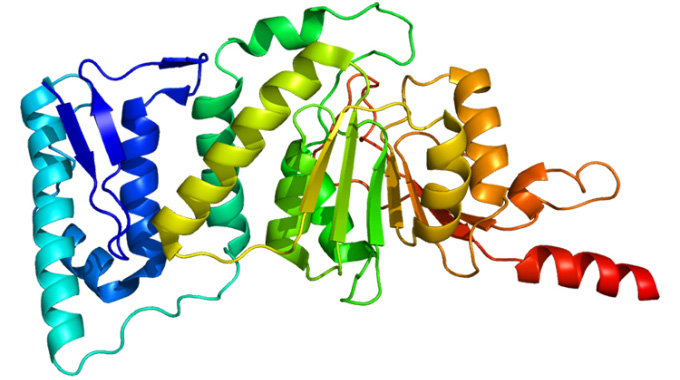Identified enzyme that helps sperm production for life
New research in mice shows that sperm production during the adult stage would not take place without the enzyme DOT1L.
While women are born with a limited number of eggs, men can produce sperm throughout their adult lives. This means they have to constantly renew their sperm stem cells, also known as SSCs, where spermatogenesis begins.
In a new study published in the journal Genes & Development, Professor Jeremy Wang and colleagues at the University of Pennsylvania School of Veterinary Medicine in the US show that SSC renewal depends on a stem cell regulator that has a named DOT1L - a protein found in eukaryotes including humans.

Structure of the enzyme DOT1L.
The team performed experiments on mice and found that animals lacking DOT1L were unable to retain sperm stem cells, which affected their ability to continue spermatogenesis. This discovery adds to the small list of stem cell renewal factors that scientists have identified so far.
"Identifying this essential factor will not only help us understand the biology of stem cells, but may one day allow us to reprogram somatic cells, such as a type of skin cell. called fibroblasts, to become germ stem cells is essentially creating a gamete in a culture dish. That's the next frontier for infertility treatment," Wang stressed.
The researchers discovered DOT1L's stem cell self-renewal function by chance when mice with the mutant form of DOT1L in every cell did not survive the embryonic stage. Wang and colleagues hypothesized that DOT1L might be involved in meiosis - the cell division that produces sperm and eggs based on the genetic expression patterns of DOT1L. So they decided to investigate what would happen if they just mutated the gene in the germ cells.
"When we did this, the animals survived and appeared healthy. However, on closer inspection, we found that the mice with the DOT1L mutation in the germ cells were only able to complete one initial cycle of sperm production, then the stem cells became depleted and the mice lost all germ cells," said the study's lead author.

When the DOT1L enzyme is inactive, the sperm stem cells are gradually depleted.
This decrease in sperm production can arise from other problems, but more evidence has demonstrated a link between DOT1L and failure of stem cell self-renewal. In particular, Wang's team found that the mice lost successive stages of sperm development, first failing to produce spermatogenic cells and then seminal vesicles, followed by spermatogenic cells. round sperm and elongated sperm.
In a further experiment, the team found that DOT1L appears to regulate a group of genes called Hoxc, transcription factors that play an important role in regulating the expression of a wide range of other genes.
"We think that DOT1L promotes the expression of Hoxc genes by methylating them. These transcription factors may contribute to stem cell self-renewal. Understanding that in detail is one way forward. go into the future for our work," added Wang.
The team's ultimate goal is to use DOT1L and other factors involved in stem cell self-renewal to help people who are having difficulty having children.
- Sperm are produced like?
- Detecting an enzyme can help prolong life
- Successful production of sperm from human skin
- Change of life by picking up the waste of sperm whale worth USD 10,000
- 10 things you don't know about sperm
- Reduced sperm because sauna?
- Breeding sperm in the laboratory
- Mechanism of enzyme action helps to control cancer
- Why eat less and prolong life
- Interesting surprises you never knew about sperm
- Who was the first to discover sperm?
- Why ambergris are more expensive than gold?
 13 causes of non-itchy rash
13 causes of non-itchy rash How the mouse with human ears changed the world?
How the mouse with human ears changed the world? The truth about 'fried rice syndrome!
The truth about 'fried rice syndrome! What is dental implant?
What is dental implant? Stroke treatment drug wins Stem Cell Innovation Award
Stroke treatment drug wins Stem Cell Innovation Award  Creating human stem cells from chemical molecules
Creating human stem cells from chemical molecules  Stem cell therapy combined with sound waves can help broken bones grow back
Stem cell therapy combined with sound waves can help broken bones grow back  China gave birth to a hybrid of pigs - monkeys
China gave birth to a hybrid of pigs - monkeys  Humans are evolving from natural selection to intellectual selection
Humans are evolving from natural selection to intellectual selection  'Shocking' findings about your body
'Shocking' findings about your body 